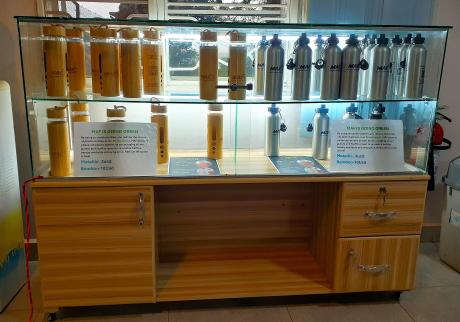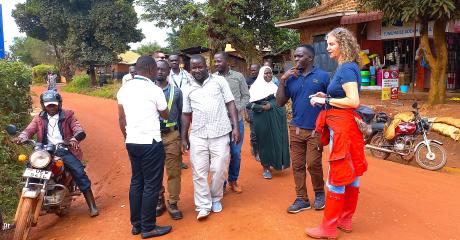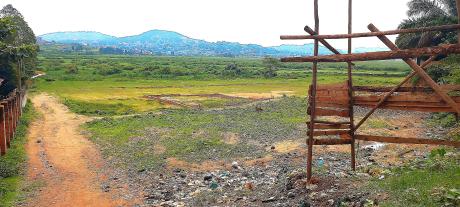Mission Aviation Fellowship’s water bottle initiative takes positive step for planet.
Mission Aviation Fellowship passengers are embracing the organisation’s efforts to conserve the environment through promotion of good practices like limiting and, where possible, removing the use of disposable plastic water bottles.
MAF last year encouraged customers in Uganda and Kenya to consider carrying reusable water bottles that they could refill before they took a flight.
“I want to support MAF efforts, we’ve flown with MAF before and it’s very important to support the charity. This is a good environmental cause and when we travel, I can carry a reusable water bottle to refill at the airport,” said MAF passenger Joe Weller.
He runs a charity that helps orphans and children from low-income families to stay in school in Moyo, in the north of Uganda. Mr Weller bought two bamboo water bottles that MAF introduced at their passenger terminal at Kajjansi Airfield in the capital Kampala.
MAF offers a bottle of water on their flight, but this comes in a one-time use non-recyclable plastic packaging. While using plastic water bottles is convenient, it can be damaging to the environment.
The Christian mission organisation has now invested in reusable portable water storage bottles for their clients.
“Working with our MAF Kenya colleagues, we have designed and purchased two types of MAF branded water bottles – a metallic one with a sports lid, and a glass and bamboo one, which is a little more elegant,” said MAF Uganda’s country director, Ruth Jack.
“Both types have the MAF logo on them, as well as our contact details, and a QR code that goes to the MAF website.”

The bottles can be purchased at MAF’s offices in Kajjansi for a small fee.
“We will encourage them to either bring their own bottles or purchase one of ours for use on the flights, in place of our provision of single-use bottles of water,” she added.
“We will continue to provide a water fountain in our customer terminal so that customers can fill up before flying, and for the time being, we will also continue to provide single-use bottles for those that have no other option.
“We don’t want our passengers dehydrating in the heat of Uganda.”
Meanwhile MAF Uganda is building partnerships with local leaders near its base in Kajjansi to come up with projects that will empower community members to be proactive in preserving their environment.
“Our plan is to start with a joint project around recycling of plastics, and the benefit of doing so versus the harm of burning them or throwing them on the ground,” Ruth Jack explained.
“Many of our staff live in Kajjansi, and they have suffered from breathing problems from the burning plastics in the past. This is a common problem across the country, but we can work in partnership with our local community to educate, inform, and help them to develop good practices around plastic recycling.”

In their initial project, MAF staff looked at problem areas, where the water flows through the community when it rains and collects waste, particularly plastics. They also looked at areas where rubbish was burnt and dumped. Because the village is higher than the MAF airfield, a lot of this waste is washed down to the airfield in rainwater, clogging up drainage channels.
“We are planning a series of events in the coming months particularly focused on educating the community which may include school visits, a litter pick, and other things still to be worked out,” she added.
